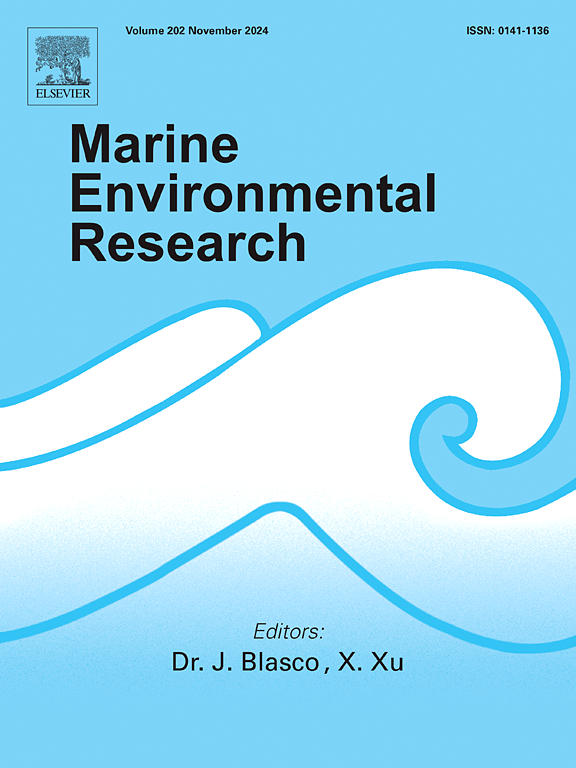慢性和急性气候变暖情况下海洋桡足类的代谢平衡
IF 3
3区 环境科学与生态学
Q2 ENVIRONMENTAL SCIENCES
引用次数: 0
摘要
我们研究了亚致死热胁迫对桡足类格拉那副桡足类生理速率的影响,并探讨了之前的热历史对这种反应的影响。这些桡足类最初在19 °C的温度下饲养,在22 °C和25 °C的温度下饲养了23代,之后暴露在应激温度(28 °C)下7天。通过比较 28 °C 与各自饲养温度下的代谢平衡,评估了桡足类的适应能力。饲养温度与饲养桡足类的体型和碳含量呈反比关系。除呼吸作用外,体重特异率随饲养温度的升高而升高,而人均代谢率的差异则趋于平缓,这部分是由于桡足类体型的差异造成的。热胁迫的影响(体重特异率折叠变化)似乎与饲养温度成反比。碳增益总体上充足,并略微超过碳损失。在各种变暖情况下,总生长效率都保持不变,强调了对环境变化的适应能力。我们的发现强调,在预测桡足类种群对气候变化相关现象(如海洋逐渐缓慢变暖或热浪事件)的反应时,考虑物种的热历史非常重要。本文章由计算机程序翻译,如有差异,请以英文原文为准。
Metabolic balance of a marine neritic copepod under chronic and acute warming scenarios
We investigated the impact of sublethal thermal stress on physiological rates of the copepod Paracartia grani, and explored the influence of previous thermal history on this response. The copepods, originally reared at 19 °C, were raised for 23 generations at 22 °C and 25 °C, and posteriorly exposed for 7-d to stress temperature (28 °C). The copepod acclimation capacity was assessed by comparing metabolic balance at 28 °C against their respective rearing temperatures. There was an inverse relationship between rearing temperature and body size and carbon content for the reared copepod lines. Weight-specific rates, except respiration, increased with rearing temperature, whereas per capita rate differences were levelled, partly due to differences in copepod size. Heat stress impact, as weight-specific rate fold-change, appeared inversely related to rearing temperature. Carbon gains were overall sufficient and slightly in excess to account for carbon losses. Gross-growth efficiency across warming scenarios was conserved, emphasizing resilience to environmental change. Our findings underscore the importance of considering the species' thermal history when predicting the response of copepod populations to climate change associated phenomena such as gradual slow ocean warming or heatwave events.
求助全文
通过发布文献求助,成功后即可免费获取论文全文。
去求助
来源期刊

Marine environmental research
环境科学-毒理学
CiteScore
5.90
自引率
3.00%
发文量
217
审稿时长
46 days
期刊介绍:
Marine Environmental Research publishes original research papers on chemical, physical, and biological interactions in the oceans and coastal waters. The journal serves as a forum for new information on biology, chemistry, and toxicology and syntheses that advance understanding of marine environmental processes.
Submission of multidisciplinary studies is encouraged. Studies that utilize experimental approaches to clarify the roles of anthropogenic and natural causes of changes in marine ecosystems are especially welcome, as are those studies that represent new developments of a theoretical or conceptual aspect of marine science. All papers published in this journal are reviewed by qualified peers prior to acceptance and publication. Examples of topics considered to be appropriate for the journal include, but are not limited to, the following:
– The extent, persistence, and consequences of change and the recovery from such change in natural marine systems
– The biochemical, physiological, and ecological consequences of contaminants to marine organisms and ecosystems
– The biogeochemistry of naturally occurring and anthropogenic substances
– Models that describe and predict the above processes
– Monitoring studies, to the extent that their results provide new information on functional processes
– Methodological papers describing improved quantitative techniques for the marine sciences.
 求助内容:
求助内容: 应助结果提醒方式:
应助结果提醒方式:


